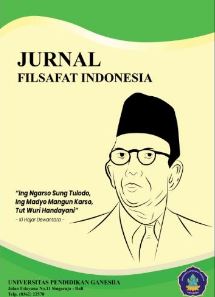THE ETHICS OF RESPONSIBILITY: Philosophical Reflections on Relationality and Its Relevance to Deaf Culture
DOI:
https://doi.org/10.23887/jfi.v6i3.61020Keywords:
relationality, deaf culture, conscience, communicationAbstract
Conscience is one thing that every human being has. The conscience becomes the witness and judge in human actions. Conscience, although it can only be felt by each person, becomes a measure of morality that is able to direct humans to act well and right. This then leads humans to act right in society. As part of society, conscientious people will also consider others in their way of life. Deaf friends are part of a society that cannot be denied. Using literature studies, this article seeks to explore the concept of relationality and then look at its relevance to Deaf culture that occurs in life. Deaf friends certainly have different cultures and rights from humans in general. Deaf culture gradually gained a place in social life. This should be triggered not only by reason, but also by human conscience which is increasingly aware of the existence of equal rights for every human being regardless of the conditions he experiences. Conscience needs to be nurtured and educated in order to be more able to make humans more morally sensitive so that Deaf Culture can really be presented to help Deaf Friends.
References
Akar Tuli Malang. (2023, Januari 31). Kelas Bahasa Isyarat Malang oleh Akar Tuli Malang.
Instagram. https://www.instagram.com/p/CoEFXV_pAe3/.
Asriandhini, B., & Rahmawati, C. H. (2021). Bahasa Isyarat Indonesia Sebagai Konstruksi
Identitas Dan Citra Sosial Tuli Di Purwokerto. JRK (Jurnal Riset Komunikasi), 12(1).
https://doi.org/10.31506/jrk.v12i1.10059.
CNN Indonesia. (2022, September 4). “Rahasia” Juru Bahasa Isyarat Sampaikan Lirik Lagu kala
Cresswell, J. W. (2012). Research Design Pendekatan Kualitatif, Kuantitatif, dan Mixed (3 ed.).
Pustaka Belajar.
Driyarkara, N. (Nicolaus), 1913-1967. (2006). Karya Lengkap Driyarkara: Esai-Esai Filsafat
Pemikir yang Terlibat Penuh dalam Perjuangan Bangsanya (A. Sudiarja, G. B. Subanar,
St. Sunardi, & T. Sarkim, Ed.). Gramedia Pustaka Utama.
https://search.library.wisc.edu/catalog/9910031883202121.
Gumelar, G., Hafiar, H., & Subekti, P. (2018). Bahasa Isyarat Indonesia Sebagai Budaya Tuli
Melalui Pemaknaan Anggota Gerakan Untuk Kesejahteraan Tuna Rungu. Informasi,
(1), 65. https://doi.org/10.21831/informasi.v48i1.17727.
Gusmian, I. (2014). Filsafat Moral Immanuel Kant: Suatu Tinjauan Paradigmatik. Al-A’raf : Jurnal
Pemikiran Islam Dan Filsafat, 11(2), 57–66. https://doi.org/10.22515/ajpif.v11i2.1190.
Lane, H., Pillard, R. C., & Hedberg, U. (2010). The People of the Eye: Deaf Ethnicity and Ancestry.
Oxford University Press. https://doi.org/10.1093/acprof:oso/9780199759293.001.0001.
Manampiring, H. (2019). Filosofi Teras. Kompas Media Nusantara.
Mindess, A. (2006). Reading between the signs: Intercultural communication for sign language
interpreters (2nd ed). Intercultural Press.
Molan, B. (2020). Relevansi Pemikiran Emanuel Levinas dalam Konteks Pandemi Covid-19.
Jurnal Respons, 25(2).
Munir, M. (2006). Voluntarisme (Filsafat Kehendak) Dalam Filsafat Barat. 16, 13
Mutiasih, & Ainun. (2023, Maret 9). Wawancara dengan Teman Tuli dan Penerjemah Bahasa
Isyarat [Komunikasi pribadi].
Palfreyman, N. (2015). Budaya tuli Indonesia dan hak bahasa. Hak Bahasa sebagai Bagian dari
Identitas Budaya, 264–270.
Riyanto, F. X. E. A. (2013). Menjadi-Mencintai. Berfilsafat Teologis Sehari-hari. Kanisius.
Riyanto, F. X. E. A. (2018). Relasionalitas, Filsafat Fondasi Interpretasi: Aku, Teks, Liyan,
Fenomen. Kanisius.
Riyanto, F. X. E. A. (2021). Remah dan Daun Kering Meditasi Spiritual-Teologi. Widya Sasana
Publication.
Sobon, K. (2018). Etika Tanggung Jawab Emmanuel Levinas. Jurnal Filsafat, 28(1), Article 1.
https://doi.org/10.22146/jf.31281.
UN General Assembly. (2006). Convention on the Rights of Persons with Disabilities: Resolution
/ adopted by the General Assembly. UN General Assembly.
https://digitallibrary.un.org/record/588742/files/A_RES_61_106-EN.pdf?ln=en.
van der Weij, P. A. (2018). Filsuf-Filsuf Besar Tentang Manusia (K. Bartens, Penerj.). Gramedia
Pustaka Utama. https://books.google.co.id/books?id=1rhSDwAAQBAJ.
Wedayanti, N. P. L. (2019, Oktober). Teman Tuli Diantara Sibi Dan Bisindo. Senarilip III. Seminar
Riset Linguistik Pengajaran Bahasa
Downloads
Published
Issue
Section
License
Copyright (c) 2023 Jurnal Filsafat Indonesia

This work is licensed under a Creative Commons Attribution-ShareAlike 4.0 International License.

Jurnal Filsafat Indonesia Undiksha is licensed under a Creative Commons Attribution-ShareAlike 4.0 International License.




